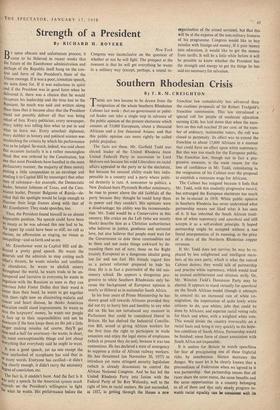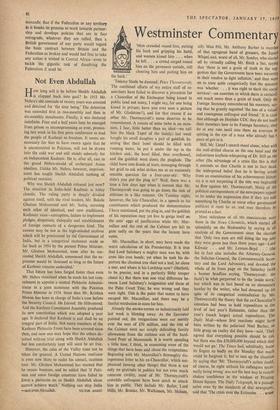Southern Rhodesian Crisis
By T. R. M. CREIGHTON.
THERE are two lessons to be drawn from the resignation of the whole Southern Rhodesian Cabinet last week : that no government or politi- cal leader can take a single step in advance of - the public opinion of the present electorate which consists of 53,000 Europeans, about a thousand Africans and a few thousand Asians; and that this public opinion can more rightly be called public prejudice.
The facts are these. Mr. Garfield Todd was elected leader of the United Rhodesia (now United Federal) Party in succession to Lord Malvern not because his mild Liberalism on racial affairs appealed to the party or to the electorate, but because his unusual ability made him indis- pensable in a country and a party where politi- cal dexterity is rare. A newcomer to politics, a New Zealand-born Plymouth Brother missionary, he rose to power above the old faithfuls of the party because they thought he could keep them in power and they couldn't. His opinions were a disadvantage; his ability was his recommenda- tion. Mr. Todd would be a Conservative in this country. His critics on the Left (who are mostly black) describe him as a Christian authoritarian who believes in justice, goodness and universal love, but also believes that people must wait for the Government to dole these commodities out to them and not make things awkward by de- manding them out of turn; those on the Right (mainly European) as a dangerous idealist going too far and too fast. His friends regard him as a patient reformer prepared to bide his time. He is in fact a paternalist of the old mis- sionary school. He appears a dangerous pro- gressive to white Southern Rhodesians only be- cause the background of European opinion is nearly as illiberal as in nationalist South Africa.
In his four years of Prime Ministership he has shown good will towards Africans provided they did not try to hurry him and hostility to any who did so. He has not introduced any measure in Parliament that could be considered liberal in Britain. He has shelved the Industrial Concilia- tion Bill, aimed at giving African workers for the first time the right to participate in trade unionism and enjoy the legal status of employees (which at present they do not), because it was too contentious. He has declared a state of emergency to suppress a strike of African railway workers. He has threatened (on November 30, 1957) to introduce yet more stringent security legislation (which is already draconian) to control the African National Congress. And he has led the United Rhodesia Party into fusion with the Federal Party of Sir Roy Welensky, well to the right of him in racial matters. He just succeeded, in 1957, in getting through the House a new franchise law considerably less advanced than the cautious proposals of Sir Robert Tredgold's franchise commission. This law introduced a special roll for people of moderate education earning £240, but laid down that when the num- bers on this roll reached 20 per cent. of the num- ber of ordinary, inalienable voters, the roll was closed in perpetuity. Its effect was to extend the franchise to about 15,000 Africans in a manner that could have no effect upon white supremacy. But this was too much for the European public. The franchise law, though not in fact a pro- gressive measure, is the main reason for the loss of confidence in Mr. Todd, culminating in the resignation of his Cabinet over the proposal to establish a minimum wage for Africans.
The Cabinet has resigned because it feels that Mr. Todd, with this modestly progressive record, has estranged the European electorate too much to be re-elected in 1958. White public opinion in Southern Rhodesia has never understood what partnership means nor liked what it has seen of it. It has inherited the South African tradi- tion of white supremacy and apartheid and still accepts it as a self-evident principle. It hoped partnership might be accepted without a too literal interpretation of its meaning, as the price of a share of the Northern Rhodesian copper revenues.
If Mr. Todd does not survive, he may be re- placed by less enlightened and intelligent mem- bers of his own party, which is what the retired Cabinet desires; they would talk of partnership and practise white supremacy, which would lead to mutual embitterment and ultimate strife. Or, Mr. Winston Field's Dominion Party may be elected. It appears to stand virtually for apartheid on the South African model (though it attempts to conceal it); an increased rate of white im- migration; the importation of quite lowly white artisans to do, qua whites, jobs that could be done by Africans; and separate racial voting rolls for black and white, with a weighted white vote. This would divide the country irrevocably on a racial basis and bring it very quickly to the hope- less condition of South Africa. Partnership would be finished; some form of closer association with South Africa not impossible.
It is useless for Britain to watch speechless for fear of precipitating one of these frightful risks by interference. Silence increases the danger. We must let it be clearly known that a precondition of Federation when we agreed to it was partnership: that partnership means that all races share the same status, the same benefits and the same opportunities in a country belonging to all of them and that only steady progress to- wards racial equality can be consistent with its demands; that if the Federation or any territory in it breaks its promise to work towards partner- ship and develops policies that are in fact retrograde, whatever they are called, then a British government of any party would regard the basic contract between Britain and the Federation as broken and would feel free to take any action it wished in Central Africa—even to tackle the gigantic task of dissolving the Federation if need be.































 Previous page
Previous page